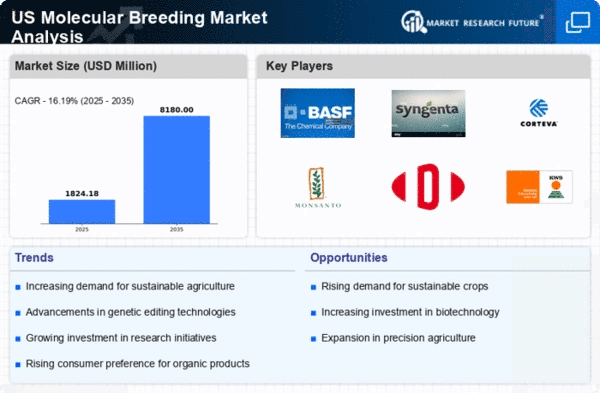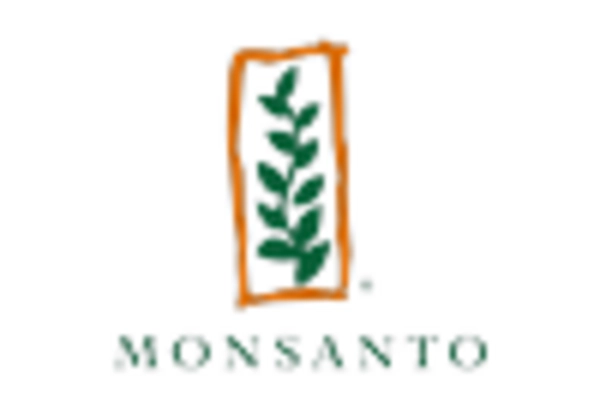Advancements in Biotechnology
Technological advancements in biotechnology are significantly influencing the molecular breeding market. Innovations such as CRISPR and other gene-editing technologies are revolutionizing the way crops are developed, allowing for precise modifications that enhance desirable traits. These advancements are expected to drive the market's growth, as they offer solutions to challenges such as pest resistance and climate adaptability. The US biotechnology sector is projected to reach a valuation of $500 billion by 2026, indicating a strong correlation with the molecular breeding market. As these technologies become more accessible, they are likely to empower breeders to create superior crop varieties more efficiently.
Rising Demand for High-Yield Crops
The molecular breeding market is experiencing a notable increase in demand for high-yield crops, driven by the need to enhance food security in the US. As the population continues to grow, the agricultural sector faces increasing pressure to produce more food on limited arable land. Molecular breeding techniques enable the development of crop varieties that are not only high-yielding but also resilient to environmental stresses. According to recent data, The market for high-yield crops is projected to grow at a compound annual growth rate (CAGR) of approximately 8% over the next five years. This trend indicates a robust opportunity for stakeholders in the molecular breeding market to innovate and meet the evolving needs of farmers and consumers alike.
Consumer Preference for Non-GMO Products
The molecular breeding market is also influenced by changing consumer preferences, particularly the growing demand for non-GMO products. As consumers become more health-conscious and environmentally aware, there is a shift towards crops developed through molecular breeding techniques that do not involve traditional genetic modification. This trend is evident in the increasing availability of non-GMO labeled products in grocery stores across the US. Market Research Future indicates that the non-GMO food market is projected to grow by 10% annually, which could lead to greater adoption of molecular breeding practices that align with consumer values.
Increased Investment in Agricultural Research
Investment in agricultural research is a critical driver for the molecular breeding market. Public and private sectors are recognizing the importance of funding research initiatives aimed at improving crop genetics. In the US, federal funding for agricultural research has seen a steady increase, with allocations reaching approximately $3 billion annually. This financial support facilitates the development of innovative molecular breeding techniques, which are essential for addressing the challenges posed by climate change and food security. As research continues to advance, the molecular breeding market is expected to benefit from the resulting breakthroughs in crop improvement.
Regulatory Support for Innovative Breeding Techniques
Regulatory frameworks in the US are evolving to support innovative breeding techniques, which is a significant driver for the molecular breeding market. The USDA and other regulatory bodies are increasingly recognizing the potential of molecular breeding to enhance crop resilience and productivity. Recent policy changes have streamlined the approval process for new varieties developed through molecular breeding, making it easier for companies to bring their products to market. This regulatory support is expected to foster innovation and investment in the molecular breeding market, ultimately benefiting farmers and consumers by providing access to improved crop varieties.

















